December 2019
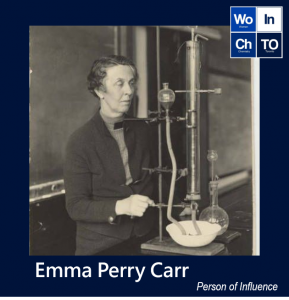
Emma Perry Carr (1880 – 1972)
Dr. Carr was a professor of Chemistry at Mount Holyoke College, a women’s college in Massachusetts. She received her PhD in Chemistry in 1910 from the University of Chicago. She served as chair of the Mount Holyoke chemistry department for over 30 years and was instrumental in growing the research program at the college. Prof. Carr was an international expert in UV spectroscopy of organic molecules, and her work contributed to fundamental understanding of electronic structures of organic molecules. Prof. Carr is recognized as an early leader in undergraduate research, which was extremely uncommon at the time. Starting out only with one simple spectrograph, she established a research group in which masters and undergraduate students worked together. Over her career at the small liberal arts college, 43 of her students went on to receive doctoral degrees in Chemistry. She was a lifelong advocate for promoting women’s role in the sciences and helped write professional documents on the matter, including, “Women in Chemistry: A Study of Professional Opportunities” (1922). In 1937, she became the first recipient of American Chemical Society’s Garvan Award, which recognizes the accomplishments of women chemists. She also sat on the award committee and was very influential in setting the principles of the award and its establishment; the award has been given every year since 1946.
November 2019
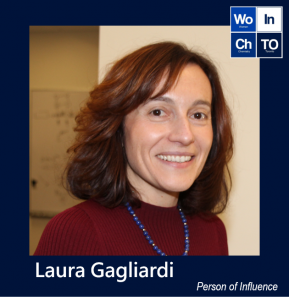
Laura Gagliardi (? - Present)
Professor Laura Gagliardi is a McKnight Presidential Endowed Chair, Distinguished McKnight University Professor, and research leader at the University of Minnesota (UMN). At UMN, she founded the Chemical Theory Centre, the Nanoporous Material Genome Center, and is the current director of the Inorganometallic Catalyst Design Centre (ICDC). The Gagliardi research group is mainly focused on the development of new correlated quantum chemistry methods. in order to speed up materials discovery , these methods are used to design new materials for separations, such as metal-organic frameworks, zeolites, and porous-polymer networks. Another focus is designing new catalytic materials and providing fundamental understanding of structure-function relationships, which can lead to discovering new catalysts.
Professor Gagliardi was one of three prominent theoreticians who called for boycotting the 15th International Congress of Quantum Chemistry, because there were no female speakers invited to the conference. In an interview with Chemistry World, Professor Gagliardi explained, “It’s not just about the conference, it is about the mentality of the community which has to change. We should encourage more women to become scientists, but how can we do that if they see these outcomes?” After bringing gender discrimination to the attention of the conference organizers and the computational chemistry community, it remains an important topic of discussion for many other chemistry conferences.
October 2019
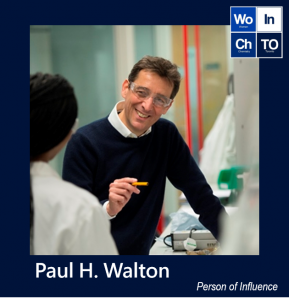
Paul H. Walton (? - Present)
Dr. Paul H. Walton is a chemistry professor at the University of York. He obtained his PhD at the University of Nottingham in 1990, followed by two years as a NATO/SERC postdoctoral research fellow at the University of California at Berkeley. He joined the chemistry department at York in 1993 as a lecturer, later becoming full professor in 1999. He also served as department chair from 2004-2010. His research lab investigates the structure, spectroscopy, and reactivity of metal ions at the active sites of lytic polysaccharide monooxygenases. His role in the discovery of the histidine brace proved to be a breakthrough for the field of sustainable biofuel production. He has received multiple awards, some of which include the Royal Society’s inaugural Athena Prize for gender equality work (runner-up), the Royal Society of Chemistry’s Higher Education Teaching Award and IChemE’s Global Award for energy research.
Prof. Walton is internationally known for his work towards gender equality in science, lectures frequently on diversity issues and is a member of the Athena Swan review group. In a recent lecture at the University of British Columbia, he encourages paternity leave as a way to neutralize the time away from work for parents. As an example of unconscious bias he stated that femininity is generally not associated with intelligence. In an interview with the Royal Society of Chemistry he noted that we are a long way off from gender parity in the sciences, and that although a lot of work needs to be done, an increased understanding of the issues at hand will allow for progress.
September 2019
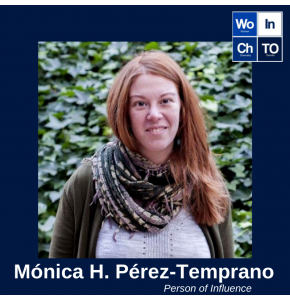
Mónica H. Pérez-Temprano (? - Present)
Mónica H. Pérez-Temprano is a research group leader at the Institute of Chemical Research of Catalonia (ICIQ). After earning her PhD from the University of Valladolid in Spain, she conducted post-doctoral research at the University of Michigan in Prof. Melanie Sanford’s group. Throughout her training, her work has focused on investigating reactions catalyzed by palladium, with particular emphasis on elucidating mechanisms. Her own research group continues to study how metal-catalyzed reactions work, but is distinguished by probing the mechanisms while developing reactions. By unraveling intricate properties that enable reactivity, they can search for ways to stabilize reaction intermediates that may guide rational design of molecules.
Pérez-Temprano is involved in outreach in Spain, which involves giving talks in school and institutes about chemistry as well as speaking about the role of women in science. She was featured in C&EN’s Talented Twelve Class of 2018 (her talk is linked below). During her interview, she shared about her experience as someone who felt different from her peers growing up, and has “learned that mentoring and being visible changes other people’s lives.”
Talented Twelve talk: https://cen.acs.org/synthesis/catalysis/Monica-Perez-Temprano/96/i33
August 2019
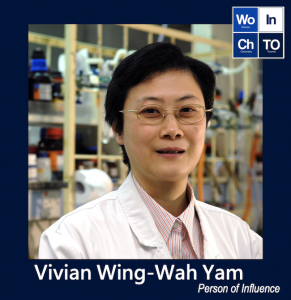
Vivian Wing-Wah Yam (1963 - Present)
Professor Vivian Wing-Wah Yam is a professor at the University of Hong Kong (@hkuniversity). She leads a research group focussed on the design and synthesis of functional inorganic and organometallic metal complexes for organic LED’s (OLED’s), biosensors and nanomaterials. To guide the design process, the group works to understand the fundamentals in excited state dynamics of molecules and effects of packing them together.
Prof. Yam earned her PhD from HKU in 1988, and was a visiting research fellow at the University of Rochester, then at the Imperial College of science and Technology. She has won several awards throughout her career. In 2011, she received the L’Oréal-UNESCO for Women in Science Award, and in 2015, the @roysocchem Ludwig Mond Award for outstanding research in inorganic chemistry. She has presented multiple lectures and taken part in documentaries and TV programs for the promotion of science and women in science. Currently, she serves as an Associate Editor for the @amerchemsociety journal Inorganic Chemistry.
Watch Prof. Yam’s Personal Story of Discovery: https://axial.acs.org/2018/08/17/vivian-yam/
July 2019

Anna Maria Tremonti (1957 – present)
Anna Maria Tremonti is a radio and television journalist from Windsor, Ontario, with a vibrant and informative career lasting the past 30+ years. This past June, after 17 seasons, she retired from her role as the founding host of CBC’s “The Current,” a morning radio show reporting on current global and Canadian affairs via interview with all kinds of people. The show has been the top listened to CBC Radio show, bringing important news to Canadians every morning with thoughtful interviews led by Tremonti. She was one of the few female foreign correspondents working for the CBC in the 90s, and has covered conflict in over 30 countries, including in Jerusalem, Bosnia, the Former Soviet Union, Germany, and more. As one of the first women to report on war for the CBC, and as one of the only women in the newsroom at the start of her career, she knew that she had to succeed in her role and has always sought out stories that she felt exposed the human condition. She brought Canadians thousands of interviews with notable people such as the Nobel Peace prize winner Malala Yousafzai, firefighters in Fort McMurray, Henry Kissinger, Bosnian women who bore children as a result of rape in the Bosnian war, and stories on Indigenous issues in Canada. Importantly, she has brought debates about science as well, including those about climate change, the anti-vaccination movement, and pipelines. After her award-winning (tens of awards earned) career on The Current, Anna Maria Tremonti is starting podcasts with the CBC.
May 2019
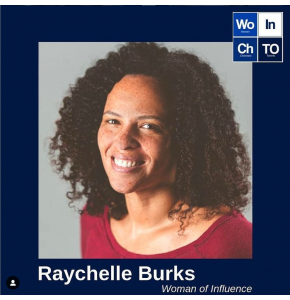
Raychelle Burks
Dr. Raychelle Burks is an analytical chemist and assistant professor in the Chemistry department at St. Edwards University in Austin, Texas. She obtained her B.S. Chemistry from Northern Iowa University, and her Ph.D. in Analytical Chemistry at University of Nebraska. Dr. Burks' work focuses on the development and analysis of affordable and field portable colourimetric sensors. Specifically, she uses smart phones for detection to maximize portability. Dr. Burks is a popular science communicator, often blending pop culture and science. She has appeared on Outrageous Acts of Science, ACS Reaction videos, and even the Mother Jones' Inquiring Minds podcast where she explained how to use chemistry to survive a zombie apocalypse. Some of her outreach work includes founding DIYSciZone at GeekGirlCon which offers a range of engaging science activities for the family. Dr. Burks is an avid advocate for women and minority groups in science.
April 2019
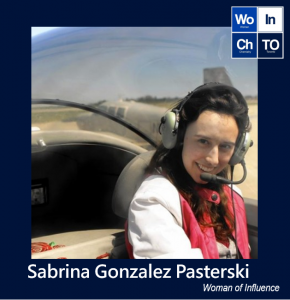
Sabrina Gonzalez Pasterski (1993 – Present)
Sabrina Gonzalez Pasterski is a PhD student at Harvard University studying theoretical physics, whose work involves understanding quantum gravity. She is an incredibly accomplished young scientist who is known for her work on the spin memory effect and the Pasterski–Strominger–Zhiboedov triangle. Already, her work has been recognized by many including Stephen Hawking, garnering her the title of “the next Einstein”. Sabrina is a first generation Cuban-American who was born and raised in Chicago. Sabrina has commented that “years of pushing the bounds of what I could achieve led me to physics”. At the early age of 9, Sabrina began flying. She received a Cessna 150 from her grandfather on her 10th birthday, and as it often broke down, she also began to practice rebuilding engines. Sabrina started rebuilding her plane’s engine at age 12, and just two days before her 14th birthday, she flew solo in her rebuilt Cessna 150. That same day, she received a job offer from Jeff Bezos (her scientific hero), which still stands today. She went on to complete her undergraduate degree at MIT in 3 years, where she graduated #1 at MIT Physics with the highest GPA achievable and as the first girl to win the MIT Physics Orloff Scholarship. She began her doctoral studies at Harvard University in 2013 under the supervision of Prof. Andrew Strominger, and gained academic independence in 2015. She is the recipient of several awards and honours, including the Hertz Foundation Fellowship, NSF Graduate Research Fellowship, Genius: 100 Visions of the Future Award, Young Women’s Honors Education/Genius Award, MIT Physics Rising Star, Stephen P. Jobs Trust’s Ozy Rising Star, and both Forbes’ and Scientific American’s 30 Under 30. In addition to her research, she has also been nationally recognized for her advocacy of STEM education for girls, promoting the Let Girls Learn Initiative in the US well as other initiatives in Cuba and Russia. Her words of advice are to “Be optimistic about what you believe you can do”. Sabrina will be defending her thesis later this week on April 17th.
March 2019
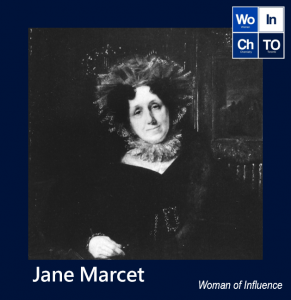
Jane Marcet (1769-1858)
Jane Marcet was born in London in 1769 to a wealthy Swiss merchant and his wife. Jane was home-schooled with her brothers, and studied chemistry, biology, history and Latin, among other languages. Although Jane’s formal studies ended when she was 15, she often acted as her father’s hostess during parties with different scientific and literary guests. In 1799, Jane married Alexander Marcet, a Swiss physician who shared her interest in chemistry, and often gave lectures along with other eminent chemists. Jane and her husband often conducted experiments in their home laboratory, and then discussed the relevant scientific principles together. After reading the proofs for one of her husband’s books, Jane decided to write her own book on chemistry so that everyone could understand the subject. Her work, “Conversations on Chemistry, Intended More Especially for the Female Sex”, was anonymously published in 1806. The book was widely popular for how user-friendly it was. Chemical concepts were explained through a series of conversations between a female teacher and two female students, and contained illustrations by Jane for further clarification. The style of dialogue made chemistry a subject that was accessible to everyone, such as women and people who did not receive a lot of schooling. This was how Conversations on Chemistry introduced Michael Faraday to the sciences while he bound the book in 1810 as a bookbinder’s apprentice. The book was translated into French and German and became widely popular in the United States. Jane was not acknowledged as the author until 1832, when the 12th edition was published. Although Jane Marcet never received any awards for her work, it is widely acknowledged that her influence on science was enormous.
Februrary 2019
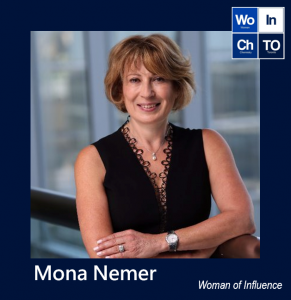
Mona Nemer (1957 – Present)
Dr. Mona Nemer is Canada’s Chief Science Advisor and a professor of biology at the University of Ottawa. She was born and raised in Lebanon where as a teen, she advocated for the creation of a science-stream at her all-girls school in Beirut. She then went on to complete her bachelor’s degree in Chemistry, minoring in both French and Mathematics at Wichita State University in 1977. She obtained a PhD in Bio-organic Chemistry from McGill University in Montreal in 1982. Her research at the University of Ottawa focuses on cardiac function and formation and she has published over 150 publications to date. In 2017, Nemer was appointed as Canada’s Chief Science Advisor where she plays a key role in helping the government make scientifically informed decisions. One of her key contributions in this role has been in developing scientific integrity policies for government scientists to help ensure their right to share their research with the Canadian public. In 2001, Nemer became a Royal Society of Canada fellow, and in 2014 she also became a member of the Order of Canada.
January 2019
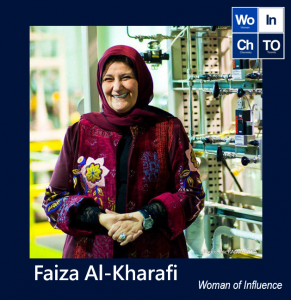
Faiza Al-Kharafi (1946 – Present)
Dr. Al-Kharafi (born 1946) is a Kuwaiti electrochemist known for her studies in corrosion science and engineering. She became the first woman to head a major university in the Middle East, is the vice president of the World Academy of Sciences, and was named one of “The 100 Most Powerful Women – Women to Watch in the Middle East” by Forbes magazine in 2005. Dr. Al-Kharafi earned her BSc degree from Ain Shams University in Egypt in 1967, and her MSc and PhD degrees from Kuwait University in 1972 and 1975, where she later became a professor of chemistry in 1987. She served as president of Kuwait University from 1993 to 2002 and is current a member of the Board of Directors of Kuwait Foundation for the Advancement of Sciences. In addition to work studying the impact of corrosion on engine cooling systems, crude oil distillation units, tap water, and geothermal brines, Al-Kharafi also studied the electrochemical behaviour of vanadium, niobium, and alumninum, and contributed to the discovery of a novel class of molybdenum-based catalysts to enhance the quality of gasoline octane. In 2006 she was awarded the Kuwait Prize in Applied Sciences and in 2011 was awarded the L’Oreal-UNESCO Awards for Women in Sciences for her work on corrosion.
